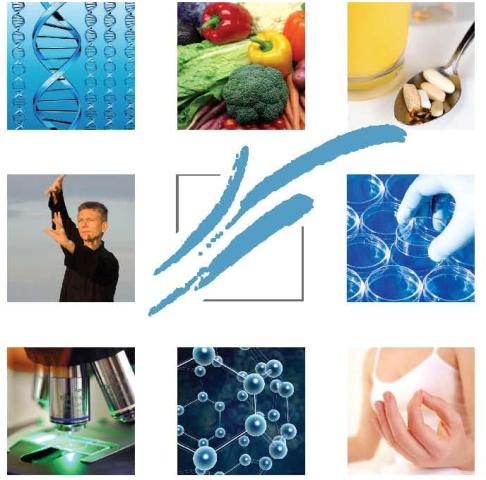
|

|

|

|
|
Flaxseed and Aromasin
|
Does flaxseed interact with Aromasin and similar medications?
Aromasin, Arimidex and Femara are all medications called “aromatase inhibitors.” They are used in breast cancer treatment for women who are post-menopausal and whose tumors are stimulated to grow by estrogen (estrogen-receptor positive or ER+ breast cancer). They are generally prescribed after patients have completed their surgery, radiation and/or chemotherapy. The enzyme aromatase that is blocked by these medications is responsible for the synthesis of estrogen in the body. While in pre-menopausal women estrogen is synthesized mainly in the ovaries, in post-menopausal women, it is synthesized in the adrenal gland and in fat tissue with the help of aromatase. The ultimate effect of aromatase inhibitor is thus to lower the levels of estrogen in the body, reducing the possibility that it will stimulate the growth of any stray breast cancer cells that remain after surgery.
When we consider flax and aromatase inhibitors there are two main possibilities for interaction. The first is a general one: flax has laxative effects because of its high fiber content. This could result in medications that are taken by mouth being sped out of the digestive system too quickly to dissolve completely. The solution to this problem is easy: take the oral medications one hour before or two hours after taking flaxseed supplements. This applies to ground flaxseed, which is quite fibrous, and not flaxseed oil, which of course has the fiber removed.
The second potential concern is a little more tricky. Flaxseed has a number of compounds called lignans which have some powerful health effects. These compounds are present in the seed but not the oil, so this second concern also applies only to the seeds. What’s been found about flaxseeds is that the lignans and some related compounds act like estrogens in the body. There are a number of plants that have estrogen-like effects on the body but are not actually estrogen (human estrogens are compounds like estradiol and estrone). They are called “phytoestrogens.” Usually the action of phytoestrogens is weaker than that of human estrogens, and this can mean that they act in the opposite way from our estrogens. This is because they attach to estrogen receptors, stimulate them weakly, while blocking estrogen binding. This prevents estradiol or estrone from attaching to the estrogen receptors and strongly stimulating them. Flaxseed also has other activities in the body: experiments show that it has a number of direct cancer-inhibitory activities.
So what does the literature say about flaxseeds as phytoestrogens? We did a search for recent literature on this topic, emphasizing studies in humans. It’s clear in some test-tube (in vitro) studies that flaxseeds can stimulate estrogen receptors or provide other types of estrogenic activity. However, there are also a number of higher level studies in animals (in vivo) in which flaxseed countered tumor growth or had anti-estrogenic effects. In one, flax reduced tumor growth that had been stimulated by soy isoflavones; in another it did not stimulate tumor growth and also reduced a particular type of estrogen receptor. It also increased the effectiveness of the anti-estrogen drug tamoxifen by reducing function of estrogen-related genes. In some related animal studies, it reduced growth of ovarian cancer in chickens, which is also stimulated by estrogen.
When we get to human studies, we find some contradictions. There are some studies that indicate possible estrogenic effects, but more that suggest flax counters estrogen or has other beneficial anticancer effects in humans. I’ll briefly review these for you.
First, the possibly negative studies. Flaxseed was found to reduce hot flashes in postmenopausal women in one study. This is concerning since estrogen is used to treat hot flashes. However, this was a preliminary study and had no control group. That’s a problem, because hot flashes can be greatly affected by the placebo effect. Another study looked at the ratios of two metabolites of estrogen, 16-alpha-hydroxyestrone (we’ll abbreviate this as16E) and 2-hydroxyestrone (2E). 16E is associated with more estrogenic stimulation than 2E, so it is worse for breast cancer. A study by Sturgeon and colleagues at the University of Massachusetts found in a controlled trial that flaxseed promoted higher levels of 16E. The final negative study was in prostate cancer. Prostate cancer patients who had biopsies were given flaxseed until their prostates were removed, and then the condition of the removed prostates was compared to the biopsied tissue. There was a lower rate of cell proliferation and lower levels of a marker called Ki-67, although no increases in cell suicide or blood levels of other markers. Since estrogen has previously been used to treat prostate cancer, perhaps this effect was due to an estrogenic effect of flaxseed.
Now, the seemingly positive studies. A study by Haggans and colleagues found that a small group of women given flaxseed actually developed more 2E relative to 16E after 2 months of flaxseed treatment. Studies by Brooks and colleagues and McCann and colleagues also found that flaxseed caused relative levels of 2E to increase (McCann also found that this was affected by genetics, and some women had greater increases in 2E than others, though apparently none of the genes tested increased 16E). A study similar to the prostate cancer study involved postmenopausal newly diagnosed breast cancer patients given either flaxseed or placebo muffins. The flaxseed muffins caused reductions in the Ki-67 index and HER2 levels and increases in cell suicide, whereas placebo muffins caused no differences. Some randomized controlled studies also examined effects of flax on menopause symptoms. These studies gave wheat to subjects to control for the placebo effect. All three found that flax decreased hot flashes, but so did wheat. This means that the flax effect was about the same as the placebo effect. Wheat can have very mild estrogenic effects, also due to lignans, but these studies seem to have ruled out this complication: one study compared flax with 46 mg lignans to wheat bran with less than 1 mg lignans. Two of the studies also measured the vaginal lining, which is quite sensitive to estrogen, and found that there was no change. This leads me to suspect that the flax effect on hot flashes was due to placebo, or possibly just a general fiber effect, not an estrogenic effect.
Flaxseed also has a number of other healthful effects. It has a high content of omega-3 fatty acids, and two studies have shown that it decreased C-reactive protein, a measure of inflammation. One intriguing test-tube study showed that it increased the effect of Herceptin, a drug used in treating some breast cancer patients, but this needs further follow-up before we can be certain this effect is actually useful.
To summarize:
In my opinion, the studies indicating that flax has no significant phytoestrogenic effect in humans are more convincing than the ones indicating that it might stimulate estrogens. This implies that flaxseed would not interact with aromatase inhibitors due to phytoestrogenic activity. You should still be cautious about the fiber effect that I mentioned above, which is of moderate concern. And of course, since flax could provide a number of other health benefits, including moderating inflammation, which may be important with breast cancer, you could consider taking flax for these reasons.
Finally, from a practical perspective, I am fine with my patients consuming cracked flax either added to a breakfast cereal or in muffins and cookies. It does provide healthy omega 3 fatty acids with a clinically beneficial anti-inflammatory effect. However, though I believe there are benefits and that they even now outweigh any genuine downsides, the impact on estrogen is still not yet fully resolved. So while I support the use of flax, I would not yet promote flax as the next superfood.
In case you want to investigate these studies further, or talk about them with your physician, I have given the references below. You can find abstracts of all the studies, and free copies of some, on the U.S. Government website called PubMed.
Test tube studies:
- Richter et al. Effects of phytoestrogen extracts isolated from flax on estradiol production and ER/PR expression in MCF7 breast cancer cells. Anticancer Res. 2010 May;30(5):1695-9.
- Mason et al. Flaxseed oil-trastuzumab interaction in breast cancer. Food Chem Toxicol. 2010 May 21. [Epub ahead of print]
Animal studies:
- Ansenberger et al. Decreased severity of ovarian cancer and increased survival in hens fed a flaxseed-enriched diet for 1 year. Gynecol Oncol. 2010 May;117(2):341-7.
- Power et al. Can the combination of flaxseed and its lignans with soy and its isoflavones reduce the growth stimulatory effect of soy and its isoflavones on established breast cancer? Mol Nutr Food Res. 2007 Jul;51(7):845-56.
- Power et al. Changes in biomarkers of estrogen receptor and growth factor signaling pathways in MCF-7 tumors after short- and long-term treatment with soy and flaxseed. J Steroid Biochem Mol Biol. 2008 Nov;112(1-3):13-9.
- Chen et al. Dietary flaxseed interaction with tamoxifen induced tumor regression in athymic mice with MCF-7 xenografts by downregulating the expression of estrogen related gene products and signal transduction pathways. Nutr Cancer. 2007;58(2):162-70.
Human studies:
- Brooks et al. Supplementation with flaxseed alters estrogen metabolism in postmenopausal women to a greater extent than does supplementation with an equal amount of soy. Am J Clin Nutr. 2004 Feb;79(2):318-25.
- Dalais et al. Effects of dietary phytoestrogens in postmenopausal women. Climacteric. 1998 Jun;1(2):124-9.
- Demark-Wahnefried et al. Flaxseed supplementation (not dietary fat restriction) reduces prostate cancer proliferation rates in men presurgery. Cancer Epidemiol Biomarkers Prev. 2008 Dec;17(12):3577-87.
- Dodin et al. The effects of flaxseed dietary supplement on lipid profile, bone mineral density, and symptoms in menopausal women: a randomized, double-blind, wheat germ placebo-controlled clinical trial. J Clin Endocrinol Metab. 2005 Mar;90(3):1390-7
- Haggans et al. The effect of flaxseed and wheat bran consumption on urinary estrogen metabolites in premenopausal women. Cancer Epidemiol Biomarkers Prev. 2000 Jul;9(7):719-25.
- Hallund et al. The effect of a lignan complex isolated from flaxseed on inflammation markers in healthy postmenopausal women. Nutr Metab Cardiovasc Dis. 2008 Sep;18(7):497-502.
- Lewis et al. A randomized controlled trial of the effect of dietary soy and flaxseed muffins on quality of life and hot flashes during menopause. Menopause. 2006 Jul-Aug;13(4):631-42.
- Lucas et al. Flaxseed improves lipid profile without altering biomarkers of bone metabolism in postmenopausal women. J Clin Endocrinol Metab. 2002 Apr;87(4):1527-32.
- McCann et al. Changes in 2-hydroxyestrone and 16alpha-hydroxyestrone metabolism with flaxseed consumption: modification by COMT and CYP1B1 genotype. Cancer Epidemiol Biomarkers Prev. 2007 Feb;16(2):256-62.
- Pan et al. Effects of a flaxseed-derived lignan supplement on C-reactive protein, IL-6 and retinol-binding protein 4 in type 2 diabetic patients. Br J Nutr. 2009 Apr;101(8):1145-9.
- Pruthi et al. Pilot evaluation of flaxseed for the management of hot flashes. J Soc Integr Oncol. 2007 Summer;5(3):106-12
- Sturgeon et al. Effect of dietary flaxseed on serum levels of estrogens and androgens in postmenopausal women. Nutr Cancer. 2008;60(5):612-8.
- Sturgeon et al. Effect of flaxseed consumption on urinary levels of estrogen metabolites in postmenopausal women. Nutr Cancer. 2010;62(2):175-80.
- Thompson et al. Dietary flaxseed alters tumor biological markers in postmenopausal breast cancer. Clin Cancer Res. 2005 May 15;11(10):3828-35.
|
|
|

|
|
 Keith I. Block, M.D.
Keith I. Block, M.D.
 read our blog
read our blog

 Keith I. Block, M.D.
Keith I. Block, M.D.
 read our blog
read our blog

